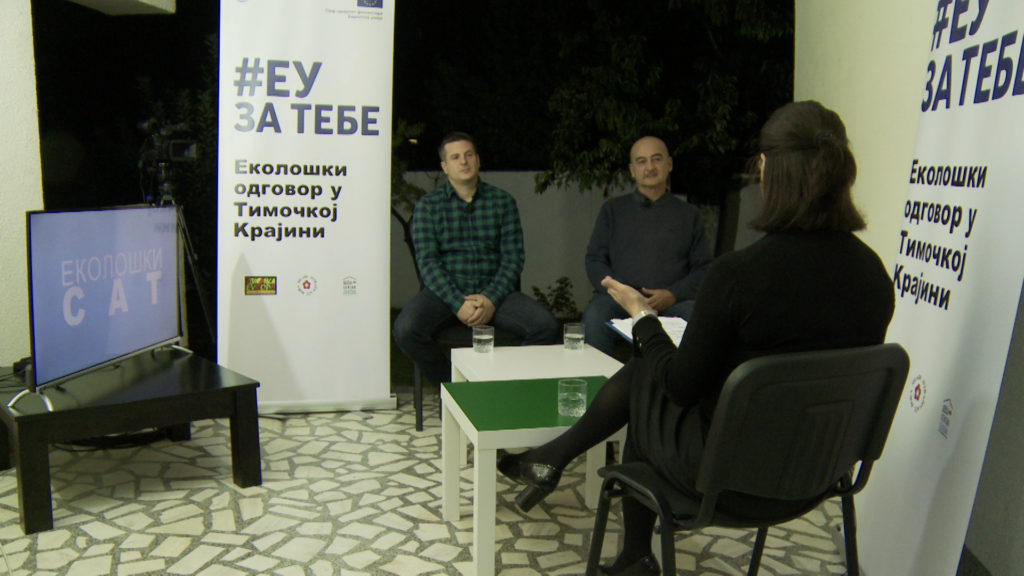
27/09/2022
Ecological Hour Show on the Legalization of Zaječar Artesian Fountains (VIDEO)
The latest episode of the “Ecological Hour” focused on the activities of the Association “Za Drinking Fountains” regarding the legalization of public artesian fountains in Zaječar. In the program, Boban Pogarčić, the president of the Association “Za Drinking Fountains”, and Nikola Šarčević, a hydrogeologist and member of the association, discussed these activities.
The “Ecological Hour” program is part of the project “Environmental Response in Timočka Krajina,” funded by the EU and implemented by the Association “Za Drinking Fountains” in collaboration with partner organizations from Bor and Zaječar.
One of the recent activities of the Association “Za Drinking Fountains” involved preventing the construction of underground containers near the “Milošević’s Fountain” at the corner of Dubrovačka and Zorana Radmilovića streets. After correspondence and reactions from the association and the Working Group for Monitoring the Implementation of the Agreement for the Preservation, Legalization, Revitalization, and Protection of Artesian Fountains, the construction of the underground container next to the artesian fountain was halted. The relevant city services will restore the area around the fountain to its previous state. The president of the “Za Drinking Fountains” Association and the chairman of the Working Group, Boban Pogarčić, praised the municipal inspection and Public Utility Company “Zaječar” for their prompt response and consideration of the association’s objections, as well as those of many citizens living in the vicinity of the fountain. They argued that the location was unsuitable for underground containers due to potential water contamination over the years.
This recent event served as a topic for the program to discuss the upcoming legalization of Zaječar’s artesian wells. The “Za Drinking Fountains” Association, established in 2015 to protect these wells from drying up caused by the drilling activities of Hotel “Serbia-Tis,” has been advocating for their legalization in recent years. They successfully halted the operation of heat pumps in the hotel, which led to the drying up of several wells. The hotel owner was conditionally sentenced for environmental damage after a legal process, as highlighted by the guests in the “Ecological Hour” program.
They emphasized that acceptance and confirmation of the reports on the reserves of Zaječar’s underground water resources are expected soon from the Ministry of Mining and Energy. This will be the basis for further actions in the legalization of all 40 currently active artesian wells. The next step will involve creating a report on sanitary protection zones for the wells to prevent situations like the recent one with “Milošević’s Fountain.” Zaječar aims to become the first city in Serbia to have ownership of water resources, legally protecting the wells. This is the ultimate goal of the “Za Drinking Fountains” Association and the City of Zaječar, and their collaboration so far is leading towards that, although the journey is neither easy nor quick, explained Boban Pogarčić and Nikola Šarčević as they appeared on the “Ecological Hour” program.
Furthermore, besides legalization, there is a plan for the reconstruction and revitalization of both above-ground and underground structures of the wells, some of which are over 100 years old and have suffered considerable deterioration due to a lack of maintenance after construction.
The guests in the program concluded that Zaječar’s artesian wells have the potential to become a brand for the city, serving as a cultural, historical, and tourist asset for the future.
This show was produced within the project “Environmental response to mining expansion in Timočka Krajina” funded by the European Union, and implemented by the Association “Za Drinking Fountains”, the Association of Young Researchers Bor, Civic Library “Europe” Bor and Children’s Center Zaječar. The content of the show is entirely responsibility of these associations and do not necessarily reflect the views of the European Union.




